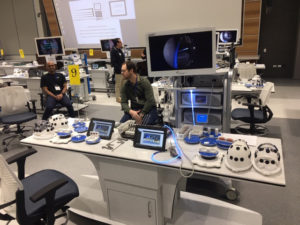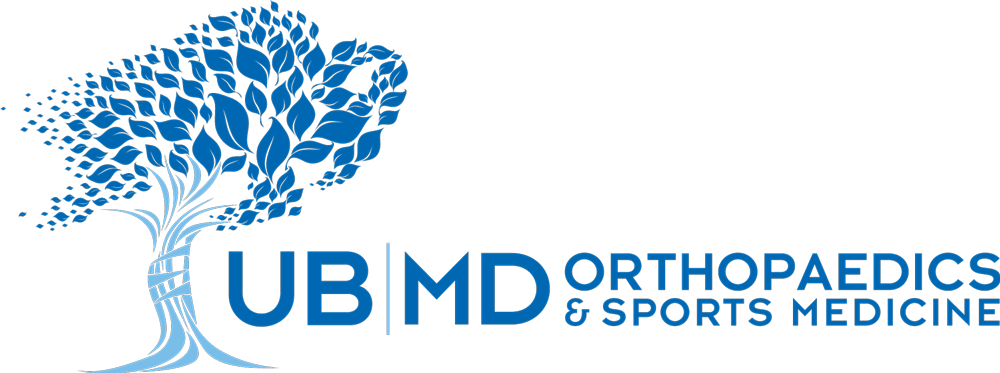On Feb. 9-10, 2020, six junior orthopaedic residents from UBMD Orthopaedics & Sports Medicine participated in a study at the American Academy of Orthopaedic Surgery Orthopaedic Learning Center in Chicago.
The residents were enrolled as subjects in the study by John Marzo, MD, a physician with UBMD Orthopaedics & Sports Medicine who specializes in education and research and is one of the study’s investigators. Other institutions participating in the study included Vanderbilt University, University of Oregon, University of Rochester, Duke University, Rush University Medical Center and Tulane University.
“We’re fortunate enough to have the support of the Wilson Foundation, which funded the purchase of a state-of-the-art arthroscopy simulator, and the leadership of Dr. Marzo, who has dedicated himself to developing and testing innovative ways to improve orthopaedic surgical training,” said Dr. Leslie Bisson, June A. and Eugene R. Mindell Professor and Chair of the Department of Orthopaedics at the Jacobs School of Medicine and Biomedical Sciences at the University at Buffalo. “They have collaborated to put Buffalo on the forefront of orthopaedic education.”
The purpose of the study was to examine whether successful completion of the Fundamentals of Arthroscopic Surgery Training (FAST) program results in improved surgical performance in the operating room. The FAST platform was initially developed in collaboration with the American Board of Orthopaedic Surgery (ABOS), the Arthroscopy Association of North America (AANA) and the American Association of Orthopaedic Surgery (AAOS). It has been carefully designed to facilitate the acquisition and assessment of skills fundamental to the performance of arthroscopic surgery.
Simulation as an educational tool has been validated extensively in the field of general surgery, and that research methodology was used as the basis for this study.
“The FAST program is one of many advancements in the new UBMD Orthopaedics & Sports Medicine curriculum which aims to enhance the surgical skills of trainees and improve overall resident education,” said Dil Patel, MD, PGY-1 orthopaedic surgery resident.
 The hypothesis is that junior residents who successfully complete the FAST program will demonstrate improved performance when compared to a matched group of residents who have not completed the FAST program.
The hypothesis is that junior residents who successfully complete the FAST program will demonstrate improved performance when compared to a matched group of residents who have not completed the FAST program.
“The FAST program grants residents an opportunity to develop fundamental skills needed to excel in the operating room,” said Patel. “It enables residents to practice surgical techniques using real-life instruments such as cameras and graspers in order to simulate arthroscopic knee and shoulder surgery. The low-risk learning environment provided by the FAST technology will undoubtedly bolster confidence in junior residents and will allow them to perform operations more smoothly on real patients.”
For purposes of the study, the residents had their skills tested in the operating room while in Buffalo by Drs. Marc Fineberg and William Wind, who are both physicians with UBMD Orthopaedics & Sports Medicine and experts in arthroscopic surgery techniques. The residents then traveled to the Orthopaedic Learning Center for two days of training, proctored by Dr. Marzo and other faculty from the participating institutions. In Chicago, the residents had pre- and post-training assessments of skill using the FAST modules and cadaveric knee specimens, as well as on a shoulder that modeled a common instability pattern. Upon return, the residents will again be tested by UBMD Orthopaedics & Sports Medicine faculty members to measure their improvement.
If the hypothesis is supported, it will facilitate the widespread adoption of the FAST program within orthopaedic educational curricula. As a result, trainees will acquire fundamental arthroscopic skills prior to operating on live patients, thereby decreasing the risk of adverse patient experiences. In addition, this research may provide the basis for the ABOS to suggest that successful completion of the FAST program become a prerequisite to sitting for Part I of the ABOS certifying examination.
